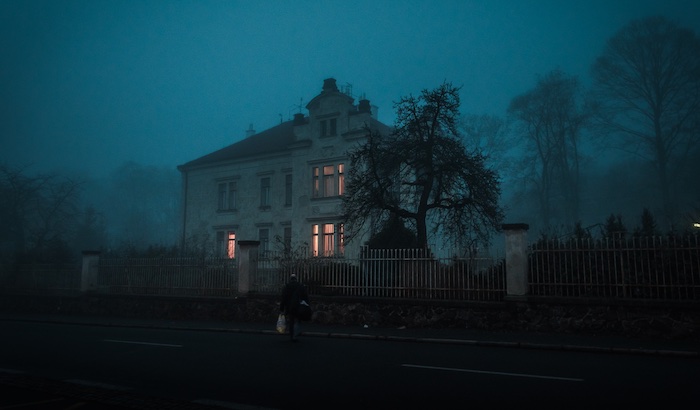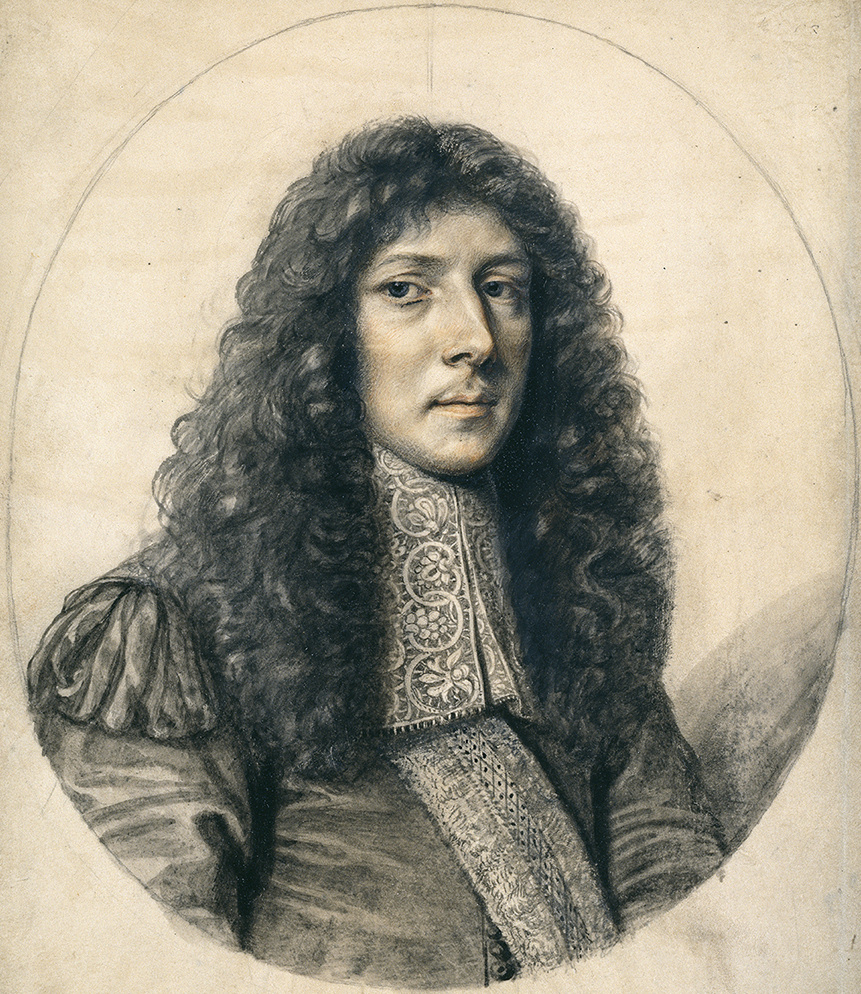This week I offer a peculiar ghost story from an equally peculiar source. It’s an odd tale from 17th century Britain of an undead married couple, a wronged servant, and a most perspicacious gentlewoman. It’s a neat template for an RPG adventure!
This post is brought to you by beloved Patreon backer Arthur Brown. Thanks for helping keep the lights on! If you want to help keep this blog going alongside Arthur, head over to the Patreon page – and thank you!

Image credit: Ján Jakub Naništa, @janjakubnanista
Our source for this story is almost as delightful as the tale itself. John Aubrey (1626-1697) was an English country gentleman: a wealthy landowner with connections to London high society. He had the ambition to write a collection of biographies, a ‘who’s who’ of contemporaneous upper-class England. He never quite got around to it. Instead, he spent night after night coming home drunk from parties and writing down all the gossip he’d heard. When he finally died, he left behind not a book but a collection of notes and letters full of the sorts of colorful details that rarely make it into sober scholarship. Different subsets of these documents have been published under the title Aubrey’s Brief Lives. I’ll do a proper post later about wild NPCs from Aubrey, but for now we’re going to focus on a single letter found in Aubrey’s collection. It’s from a reverend, one Andrew Paschal, about a haunting supposedly occurring in a nearby parish. The good reverend naturally had never witnessed the haunting, but reported the details breathlessly to Aubrey all the same. Aubrey, never one to put aside juicy gossip, hung onto the letter, and it was found among his effects after his death.
The haunting occurred in the manor house of one Mr. Furze of Spreyton, in the county of Devon. The young Mr. Furze employed a servant named Francis Fry. One night Fry was in a field near the manor when he was visited by the shade of Mr. Furze’s recently-deceased father, who was carrying a pole with a sharpened end that he liked to carry with him in life to kill moles. The ghost of the late Mr. Furze reassured Fry that he wasn’t in any trouble, but that there were several items from his will that had not yet been handled. All these items were trivial: ten shillings to so-and-so, twenty shillings to the heir of such-and-such, and so on. Fry reported this event to the younger, still-living, Mr. Furze who handed Fry some money – one imagines with some muttering about how most sons stop being nagged by their fathers when they succeed them – and had Fry distribute the money according to the ghost’s wishes. Everything went smoothly except for twenty shillings owed to the late Mr. Furze’s sister. The aged Mrs. Furze refused to take the devil money sent to her by a ghost. The shade of the late Mr. Furze appeared once more to Fry, who was indignant that the ghost was still bothering him – he’d done what he’d been asked, hadn’t he? It wasn’t Fry’s fault the shade’s sister wouldn’t take the money. The ghost of the late Mr. Furze urged Fry to buy a ring with the money and give the old woman the ring instead. She accepted it. All’s well that ends well, right?
Not so fast! For on the ride home to Spreyton, Fry was astonished to discover a different old woman riding behind him on his horse. It was none other than the ghost of the late Mr. Furze’s second wife, whom the first ghost had called “that wicked woman my wife” in an earlier conversation with Fry. The terrified horse bucked off Fry and the ghost of Mrs. Furze and ran off.

From then on, the ghost of the late Mrs. Furze attacked poor Francis Fry without ceasing. She stuck pins in his side. She made a bird pick up a brass weight in its beak and fly into his forehead to knock him out. She bent his legs up over his neck like a pretzel. She even weaponized the house’s furniture, once squeezing his head between a bed and a wall and repeatedly trapping his legs in holes in chairs. For her most most theatrical attack, Mrs. Furze grabbed Fry by his doublet and carried him in the air so high the manor shrunk to the size of a rooster, then dropped him in a mire. Several members of the Furze household claimed to have seen the devilish shade in various forms: that of her living self – sometimes wearing the same clothes as other people in the room – that of a dog breathing fire, and that of a horse leaving through a window. But mostly she remained invisible while she worked her mischief.
The ghost also did a bunch of poltergeist stuff. She broke open the box in which Fry kept his best powdered wig and tore it to pieces. She animated his shoelaces and had them crawl out of his shoes. She broke his buckles and tore apart his clothes while he was wearing them. She also participated in more domestic mischief: marching a barrel of salt from one room to another and prematurely cooking two sides of bacon. All this business impacted Fry’s work output; he was so busy being pranked and attacked that he got little done.
The pastor who wrote about this affair was quick to blame the victims. He wouldn’t visit the Furze manor because the household wasn’t Anglican. He told Fry’s mother that he suspected the servant was concealing some important fact that, if revealed, would explain both the haunting and a means for a cure. He advised her to encourage her son to declare everything both ghosts had told him. Until then, he washed his hands of the affair.

Image credit: Derek Harper. Released under a CC BY-SA 2.0 license.
When turning the Furze poltergeist into an adventure, there are a couple of directions you can take it. The most straightforward is to have the PCs show up mid-haunting and be asked to do something about it. This makes a great template for an investigation, because there are so many ways the party can dig into the problem. They can take the tack Reverend Paschal advises and get Fry (or your version of him in your fictional setting) to admit the secret that makes this all make sense. They can go talk to the late Mr. Furze’s living sister and see why she would accept a ring but not money, and what that has to do with the haunting. They might talk to the younger, living Mr. Furze or his other servants and see if any of them have insight. They can try to have a one-on-one conversation with the angry ghost of the late Mrs. Furze. They might even summon the ghost of the late Mr. Furze and ask him for his perspective. In any RPG mystery you want at least three routes to the truth, because the players will usually overlook one route and give up on the other halfway through. With a mystery as full of possible avenues as this one (six, by my count), you can even have each NPC hold part of the solution. Once the party has two or three such parts, they can probably guess at the whole picture.
And what is the secret that makes this whole story make sense? In my fictional campaign, I’d have it be that the old woman Fry delivered the ring to is not the late Mr. Furze’s sister. She’s actually his lover: an attendant, roommate, or dear friend of the real sister, who’s been dead for some time. No one knows the sister is dead and the lover stayed in her rooms so the late Mr. Furze had an excuse to visit. Fry giving her a ring – a symbol of marriage – on behalf of Mr. Furze, even after Mr. Furze’s death, was enough to send the late Mrs. Furze into a jealous rage.
If you prefer, you can also make the PCs haunted instead of Francis Fry. Your fictional version of Fry asks the party to deliver this ring to a woman in the next town, and on the way back to Furze House, the ghost of the late Mrs. Furze attacks the party! Fry knows more than he lets on (and so might the younger, living Mr. Furze), hence asking the party to deliver the ring instead of doing it himself.






